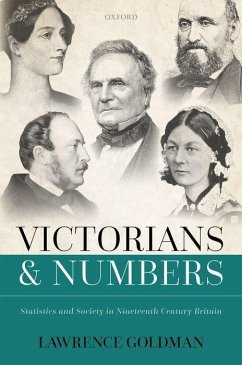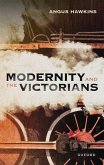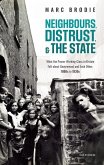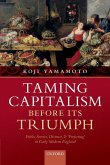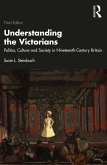Lawrence Goldman (Emeritus Fellow, Emeritus Fellow, St. Peter's Col
Victorians and Numbers
Statistics and Society in Nineteenth Century Britain
Lawrence Goldman (Emeritus Fellow, Emeritus Fellow, St. Peter's Col
Victorians and Numbers
Statistics and Society in Nineteenth Century Britain
- Gebundenes Buch
- Merkliste
- Auf die Merkliste
- Bewerten Bewerten
- Teilen
- Produkt teilen
- Produkterinnerung
- Produkterinnerung
A defining feature of Victorian Britain was its fascination with statistics, and this study shows how data influenced every aspect of Victorian culture and thought, from the methods of natural science and the struggle against disease, to the development of social administration, and the arguments and conflicts between social classes.
Andere Kunden interessierten sich auch für
![Modernity and the Victorians Modernity and the Victorians]() Angus Hawkins (Former P Former Professor of Modern British HistoryModernity and the Victorians112,99 €
Angus Hawkins (Former P Former Professor of Modern British HistoryModernity and the Victorians112,99 €![Neighbours, Distrust, and the State Neighbours, Distrust, and the State]() Marc Brodie (former fellow, former fellow, University of Oxford)Neighbours, Distrust, and the State67,99 €
Marc Brodie (former fellow, former fellow, University of Oxford)Neighbours, Distrust, and the State67,99 €![Taming Capitalism Before Its Triumph Taming Capitalism Before Its Triumph]() Koji Yamamoto (Assistant P Assistant Professor in Business HistoryTaming Capitalism Before Its Triumph42,99 €
Koji Yamamoto (Assistant P Assistant Professor in Business HistoryTaming Capitalism Before Its Triumph42,99 €![Understanding the Victorians Understanding the Victorians]() Susie L. SteinbachUnderstanding the Victorians41,99 €
Susie L. SteinbachUnderstanding the Victorians41,99 €![History of Universities: Volume XXXV / 1 History of Universities: Volume XXXV / 1]() Robin Darwall-SmithHistory of Universities: Volume XXXV / 1116,99 €
Robin Darwall-SmithHistory of Universities: Volume XXXV / 1116,99 €![How Romantics and Victorians Organized Information How Romantics and Victorians Organized Information]() Jillian M. Hess (Bronx Community Co Associate Professor of EnglishHow Romantics and Victorians Organized Information36,99 €
Jillian M. Hess (Bronx Community Co Associate Professor of EnglishHow Romantics and Victorians Organized Information36,99 €![The Victorians and English Dialect The Victorians and English Dialect]() Matthew Townend (Professor of English, Professor of English, UniverThe Victorians and English Dialect69,99 €
Matthew Townend (Professor of English, Professor of English, UniverThe Victorians and English Dialect69,99 €-
-
-
A defining feature of Victorian Britain was its fascination with statistics, and this study shows how data influenced every aspect of Victorian culture and thought, from the methods of natural science and the struggle against disease, to the development of social administration, and the arguments and conflicts between social classes.
Hinweis: Dieser Artikel kann nur an eine deutsche Lieferadresse ausgeliefert werden.
Hinweis: Dieser Artikel kann nur an eine deutsche Lieferadresse ausgeliefert werden.
Produktdetails
- Produktdetails
- Verlag: Oxford University Press
- Seitenzahl: 448
- Erscheinungstermin: 2. Mai 2022
- Englisch
- Abmessung: 238mm x 159mm x 32mm
- Gewicht: 814g
- ISBN-13: 9780192847744
- ISBN-10: 0192847740
- Artikelnr.: 63410657
- Herstellerkennzeichnung
- Libri GmbH
- Europaallee 1
- 36244 Bad Hersfeld
- gpsr@libri.de
- Verlag: Oxford University Press
- Seitenzahl: 448
- Erscheinungstermin: 2. Mai 2022
- Englisch
- Abmessung: 238mm x 159mm x 32mm
- Gewicht: 814g
- ISBN-13: 9780192847744
- ISBN-10: 0192847740
- Artikelnr.: 63410657
- Herstellerkennzeichnung
- Libri GmbH
- Europaallee 1
- 36244 Bad Hersfeld
- gpsr@libri.de
Lawrence Goldman was born in London and educated at Cambridge and Yale. Following a Junior Research Fellowship at Trinity College, Cambridge, he taught British and American History for three decades in Oxford, where he was a fellow of St. Peter's College, and Editor of the Oxford Dictionary of National Biography 2004-2014. Latterly he was Director of the Institute of Historical Research, University of London. His publications include books on Victorian social science and the history of workers' education, and a biography of the historian and political thinker R. H. Tawney. He is now Emeritus Fellow of St. Peter's College, Oxford.
* Introduction: Victorians and Numbers
* Prologue: Statistics at the Zenith: The International Statistical
Congress, London 1860
* Part I: Political Arithmetic and Statistics 1660-1840
* 1: Before the Victorians
* Part II: The Origins of the Statistical Movement 1825-1835
* 2: Cambridge and London: The Cambridge Network and the Statistical
Society of London
* 3: Manchester: The Manchester Statistical Society: Industry,
Sectarianism and Reform
* 4: Clerkenwell: The London Statistical Society and Artisan
Statisticians, 1825-30
* Part III: Intellectual Influences
* 5: Charles Babbage and Ada Lovelace: Statistics and Computing
* 6: Richard Jones and William Whewell: Statistics, Induction, and
Political Economy
* 7: Adolphe Quetelet: Social Physics, Determinism, and 'The Average
Man'
* 8: Alexander von Humboldt: Humboldtian Science, Natural Theology, and
the Unity of Nature
* 9: The Opposition to Numbers: Disraeli, Dickens, Ruskin, and Carlyle
* Part IV: Statistics at Mid-Century
* 10: Mapping and Defining British Statistics
* 11: Buckle's Fatal History: Making Statistics Popular
* 12: Statistics and Medicine
* Part V: Liberal Decline and Reinvention
* 13: The International Statistical Congress 1851-78: Conservative
Nationalism versus Liberal Internationalism
* 14: The End of the Statistical Movement: Francis Galton, Variation
and Eugenics
* 15: Social Statistics in the 1880s: The Industrial Remuneration
Conference, London 1885
* 16: Conclusion: From Statistics to Big Data 1822-2022
* Prologue: Statistics at the Zenith: The International Statistical
Congress, London 1860
* Part I: Political Arithmetic and Statistics 1660-1840
* 1: Before the Victorians
* Part II: The Origins of the Statistical Movement 1825-1835
* 2: Cambridge and London: The Cambridge Network and the Statistical
Society of London
* 3: Manchester: The Manchester Statistical Society: Industry,
Sectarianism and Reform
* 4: Clerkenwell: The London Statistical Society and Artisan
Statisticians, 1825-30
* Part III: Intellectual Influences
* 5: Charles Babbage and Ada Lovelace: Statistics and Computing
* 6: Richard Jones and William Whewell: Statistics, Induction, and
Political Economy
* 7: Adolphe Quetelet: Social Physics, Determinism, and 'The Average
Man'
* 8: Alexander von Humboldt: Humboldtian Science, Natural Theology, and
the Unity of Nature
* 9: The Opposition to Numbers: Disraeli, Dickens, Ruskin, and Carlyle
* Part IV: Statistics at Mid-Century
* 10: Mapping and Defining British Statistics
* 11: Buckle's Fatal History: Making Statistics Popular
* 12: Statistics and Medicine
* Part V: Liberal Decline and Reinvention
* 13: The International Statistical Congress 1851-78: Conservative
Nationalism versus Liberal Internationalism
* 14: The End of the Statistical Movement: Francis Galton, Variation
and Eugenics
* 15: Social Statistics in the 1880s: The Industrial Remuneration
Conference, London 1885
* 16: Conclusion: From Statistics to Big Data 1822-2022
* Introduction: Victorians and Numbers
* Prologue: Statistics at the Zenith: The International Statistical
Congress, London 1860
* Part I: Political Arithmetic and Statistics 1660-1840
* 1: Before the Victorians
* Part II: The Origins of the Statistical Movement 1825-1835
* 2: Cambridge and London: The Cambridge Network and the Statistical
Society of London
* 3: Manchester: The Manchester Statistical Society: Industry,
Sectarianism and Reform
* 4: Clerkenwell: The London Statistical Society and Artisan
Statisticians, 1825-30
* Part III: Intellectual Influences
* 5: Charles Babbage and Ada Lovelace: Statistics and Computing
* 6: Richard Jones and William Whewell: Statistics, Induction, and
Political Economy
* 7: Adolphe Quetelet: Social Physics, Determinism, and 'The Average
Man'
* 8: Alexander von Humboldt: Humboldtian Science, Natural Theology, and
the Unity of Nature
* 9: The Opposition to Numbers: Disraeli, Dickens, Ruskin, and Carlyle
* Part IV: Statistics at Mid-Century
* 10: Mapping and Defining British Statistics
* 11: Buckle's Fatal History: Making Statistics Popular
* 12: Statistics and Medicine
* Part V: Liberal Decline and Reinvention
* 13: The International Statistical Congress 1851-78: Conservative
Nationalism versus Liberal Internationalism
* 14: The End of the Statistical Movement: Francis Galton, Variation
and Eugenics
* 15: Social Statistics in the 1880s: The Industrial Remuneration
Conference, London 1885
* 16: Conclusion: From Statistics to Big Data 1822-2022
* Prologue: Statistics at the Zenith: The International Statistical
Congress, London 1860
* Part I: Political Arithmetic and Statistics 1660-1840
* 1: Before the Victorians
* Part II: The Origins of the Statistical Movement 1825-1835
* 2: Cambridge and London: The Cambridge Network and the Statistical
Society of London
* 3: Manchester: The Manchester Statistical Society: Industry,
Sectarianism and Reform
* 4: Clerkenwell: The London Statistical Society and Artisan
Statisticians, 1825-30
* Part III: Intellectual Influences
* 5: Charles Babbage and Ada Lovelace: Statistics and Computing
* 6: Richard Jones and William Whewell: Statistics, Induction, and
Political Economy
* 7: Adolphe Quetelet: Social Physics, Determinism, and 'The Average
Man'
* 8: Alexander von Humboldt: Humboldtian Science, Natural Theology, and
the Unity of Nature
* 9: The Opposition to Numbers: Disraeli, Dickens, Ruskin, and Carlyle
* Part IV: Statistics at Mid-Century
* 10: Mapping and Defining British Statistics
* 11: Buckle's Fatal History: Making Statistics Popular
* 12: Statistics and Medicine
* Part V: Liberal Decline and Reinvention
* 13: The International Statistical Congress 1851-78: Conservative
Nationalism versus Liberal Internationalism
* 14: The End of the Statistical Movement: Francis Galton, Variation
and Eugenics
* 15: Social Statistics in the 1880s: The Industrial Remuneration
Conference, London 1885
* 16: Conclusion: From Statistics to Big Data 1822-2022

